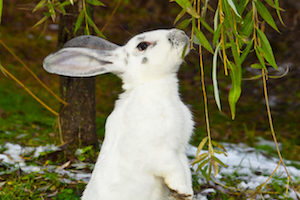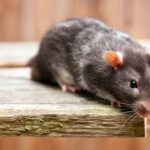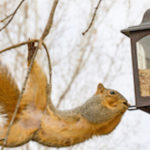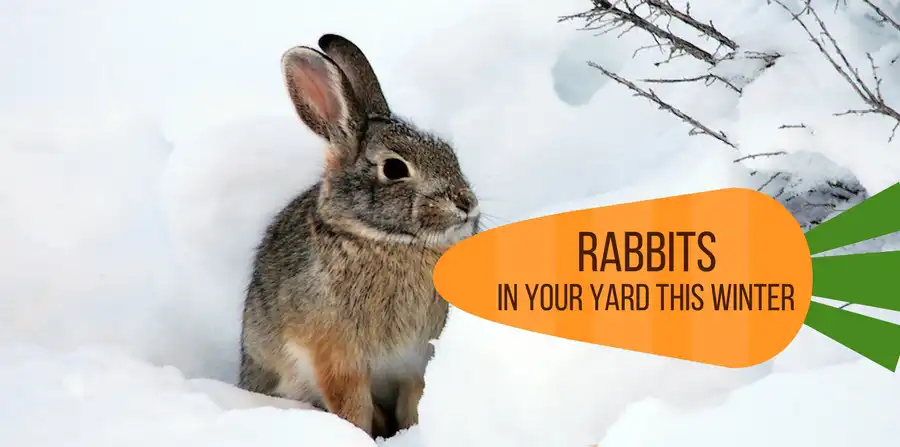
Say what you will about the harshness of Michigan’s winters, but at least they can be beautiful. The pale evening sky lit in hues of violet and ghostly blue… tree branches kissed with the gossamer gloss of new frost… freshly fallen snow blanketing the earth in forgetful snow, perfect and un-bespoiled… thousands of tiny, perfectly spherical pellets of poop covering your yard–wait a minute!
Rabbits are active year-round, but chances are you tend to notice them a lot more this time of year. For obvious reasons. Not only are these little poo-machines on your lawn gross and annoying, but they can also be destructive.
Here’s everything you should know about what those rascally rabbits are up to this winter. Learn what they want and why it’s a problem, and you’ll be ready to keep them away.
What They Want:
Food
Rabbits don’t hibernate in the winter, which means they actively seek food sources all season long. Unlike most winter invaders, rabbits are mostly content outside. Rabbits primarily feed on grass and other ground level plants. After snow falls, however, they often can’t access the grass they’d normally rely on. To survive, they have to get a little less picky and a lot more creative.
If you have rabbits around your yard this winter, it’s probably because they’ve found a good food source nearby. For most homes, these food sources are leafy ornamental plants that are tall enough to remain visible even after snowfall. Hostas, burning bush plants, tall shrubs, twigs, bark, and tree buds all attract hungry bunnies.
Cover
Food isn’t the only thing a rabbit has to be particularly concerned about during winter. The loss of vegetation density means predators can spot their prey much more easily. Since they don’t hibernate like some Michigan winter wildlife does, rabbits must find places where they can both eat and hide from predators.
During winter, rabbits look for areas where they can eat without being harassed. They’re looking for thick bushes, evergreen trees, solid fences, and pretty much anything else predators can’t see through. Cover doesn’t attract rabbits the way food does, but it’s a definite secondary consideration. If your home provides a place to eat and hide, chances are the little bush tails will show up in force.
Why They’re a Problem
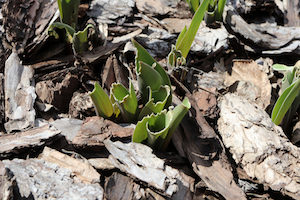 A rabbit eat a lot. Feeding rabbits can strip bark from trees, de-bud or de-leaf plants, and even gnaw bushes down to their roots. Unfortunately, they ramp up their feeding on shrubs and other plants at an inconvenient time. Winter is just as hard on plants as it is on everything else. When rabbits eat, they often “clip” stems off of plants like, fruit trees, conifers, and other shrubs. Without stems, it’s more difficult for plants to absorb the energy they need to keep surviving and, eventually, growing.
A rabbit eat a lot. Feeding rabbits can strip bark from trees, de-bud or de-leaf plants, and even gnaw bushes down to their roots. Unfortunately, they ramp up their feeding on shrubs and other plants at an inconvenient time. Winter is just as hard on plants as it is on everything else. When rabbits eat, they often “clip” stems off of plants like, fruit trees, conifers, and other shrubs. Without stems, it’s more difficult for plants to absorb the energy they need to keep surviving and, eventually, growing.
When rabbits try to get at food or shelter, they can burrow through snow or gnaw away at structures. There’s also the… “waste” issue. You probably don’t like seeing the thousand-odd rabbit pellets left scattered all over your backyard. It’s gross, smelly, and dirty, especially come spring thaw.
What You Can Do
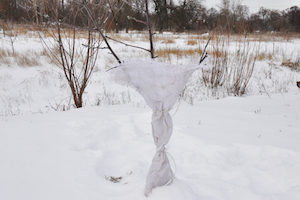 Besides calling your favorite residential pest control experts in Michigan, there are a few steps you can take to reduce the rabbit brigade filling your yard with land mines. And if you’re traveling for the holidays, make sure you pest-proof your home before you leave.
Besides calling your favorite residential pest control experts in Michigan, there are a few steps you can take to reduce the rabbit brigade filling your yard with land mines. And if you’re traveling for the holidays, make sure you pest-proof your home before you leave.
Installing a fence around your entire backyard may seem like the obvious answer, but fences have their drawbacks. First of all, rabbits are quite good at squeezing beneath traditional yard fences. Second, fences might actually attract rabbits looking for shelter from predators. If you have a rabbit problem, we recommend selective fencing, whether or not you already have a backyard fence.
Build or install wire-mesh fencing around any plants you think may be vulnerable to rabbit feeding. Make sure your fences extend down to the actual ground, because rabbits can easily burrow through snow. You should also consider clearing fallen twigs and branches from your yard frequently over the winter. Collecting clutter like this can help make your yard less interesting to hungry rabbits. Trimming your ornamental shrubs in winter can help deprive wildlife of the shelters they’re eager to find, too. Just make sure you don’t get so zealous that you harm your vulnerable plants the way the rabbits might!
We get that you probably don’t think of rabbits as pests. They’re not trying to get into your house, they can’t hurt you, and they’re just so darn cute! You’d be surprised what a pain rabbits can be during the winter. Beyond making your yard look bad, they can ruin your plants or even make your pets sick.
Don’t worry about the rabbits; humane exclusionary measures like fences won’t hurt them. And they’ll be able to find food elsewhere–trust us. If you have any questions about wildlife or any other pest problem this winter, give Griffin a call any time. We’ll help you deal with the bad parts of winter, so you can get back to finding the good stuff. We have a page that talks about all the seasonal pests found in Michigan as well. Learn More about them!

